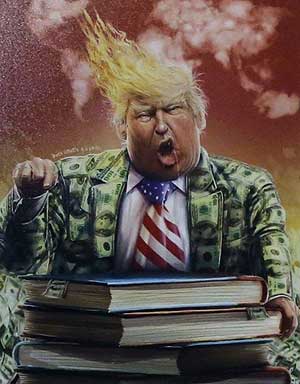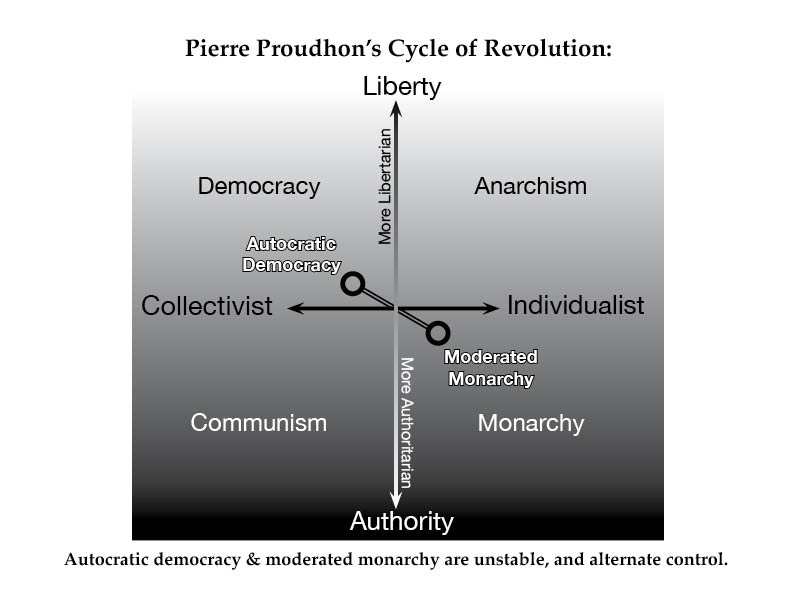July 14, 2017
The veracity of the following conversation is debatable, since the transcriber openly admits that it could have been a reefer reverie. Perhaps, even if this ultimately turns out to be “fake news,” something of use can be gleaned.

M. Proudhon: Bonjour, Monsieur Calhoun. I’ve long wanted to meet my American counterpart - a fraternal champion of federalism. If I haven’t publicly acknowledged your contributions, please pardon me. Other issues, of which we will not speak at this time, prevented me from giving you due credit.
M. Calhoun: Think nothing of it, Monsieur Proudhon. I, too, am guilty of not citing you. I’m afraid “anarchist” still means disorder and lawlessness in these United States. The common man does not understand that you mean bottom-up confederation, with explicit contractual rights for nullification and secession. In your insightful manuscript “The Principle of Federation,” you had an interesting theory of political change which bears on our subject at hand: How did a demagog like Trump get elected in the 2016 election? What makes him so popular, or at least electable, M. Proudhon?
M. Proudhon: Authority and liberty are the two poles of politics. Their opposition - antithetical, diametrical, contradictory - is our certain guarantee that a third term is impossible, that it does not exist. Between yes and no, between being and non-being, logic permits nothing.
From these two ideas society receives two different regimes which we have called the regime of authority and the regime of liberty; each of these may then adopt two different forms, no more, no less. May I use a powerpoint slide?
M. Calhoun: Please, monsieur. This conversation is a hashish induced dream. You are quite free to do so.
M. Proudhon: You are so kind.
 Every real government is necessarily mixed, whether it is called a monarchy or a democracy. This is an important consideration; it alone permits us to trace the countless frauds, corruptions, and revolutions of politics to a logical error.
Every real government is necessarily mixed, whether it is called a monarchy or a democracy. This is an important consideration; it alone permits us to trace the countless frauds, corruptions, and revolutions of politics to a logical error.
All varieties of existing government, all the political compromises attempted or proposed from the most ancient times to our own day, may be reduced to two principal types, which I shall call, using their current names, empire (autocratic democracy) and constitutional moderated monarchy.
M. Calhoun: Those are the only stable types of government?
M. Proudhon: Not stable. I’m saying that, unless something revolutionary occurs, a revolutionary new type of constitution, government will almost certainly alternate between autocratic democracy and moderated monarchy. There are (what Austrian economists would call) praxeological reasons for this. I will explain it in terms of class theory.
Since men have lived from the very beginning with war and inequality of wealth, society divides naturally into a certain number of classes. The struggle of classes determines the political regime. Step by step all these classes are resolved into two: an upper class, aristocracy, bourgeoisie, or patrician class; and a lower, plebs or proletariat, between which is suspended royalty, the organ of power, the expression of authority.
If the aristocracy unites with royalty, the resulting government will be a moderated monarchy, currently called constitutional; if it is the people who unite with authority, the government will be an empire or autocratic democracy.
This explains the Trump phenomena.
M. Calhoun: You consider Trump as a populist democratic candidate, and the Democratic faction as the monarchists?
M. Proudhon: Certainly! The corporate cronies and government enforced cartels in banking and agriculture and ... well, no need to list the many usurpations of State. You are well aware of the problem.
What is surprising is that a moderated monarchy is often more favorable to liberty than a democracy. This is a wonderful contradiction! A government founded by bourgeois or patricians in alliance with a dynasty is generally more liberal than one founded by the masses under the leadership of a dictator or a tribune. The phenomenon may indeed seem all the more surprising in that the people are at bottom more interested in and more genuinely attached to liberty than the bourgeoisie. But this paradox, the great stumbling-block of politics, is explained by the situation of the parties: in the case of a popular victory, the people must think and act autocratically, but when the bourgeois enjoy supremacy they think and act as republicans.
But the same cause which sets the bourgeoisie and the people against each other soon leads both of them full circle. In order to ensure victory, democracy, since it is ignorant of the requirements of power and incapable of exercising it, equips itself with an absolute leader, before whom all privileges of caste disappear. In my country, we got Napoleon. In the US they got Donald Trump. Democracy loves a hero-despot that has all the answers.
M. Calhoun: I understand. We got Lincoln, who imprisoned critics, shut down opposition newspapers, suspended habeas corpus, … but I digress. That happened shortly after my death, anyway. They should have listened to us and gone the federation route.
M. Proudhon: In my own home-country of France, we went from king to democratic despot to king to despot, with short eruptions of communism, such as the infamously bloody Terror. The US has had a similar, but fortunately less bloody, back-and-forth handoff of power between the autocratic democracy faction and the moderated monarchist faction. The Democratic Party was, at one time anyway, the authoritarian democracy faction. The Republican Party was traditionally the moderated monarchy faction.
But something happened in the mid to late 20th century. Perhaps it was increasing corporatism - government subsidies and favors for certain connected interests - released by the advent of fiat currency. Maybe it was the wars facilitated by that fiat money. Then again, it may have been the growth of a fascist cancer that started much earlier. At any rate, the Democratic Party ‘drank the corporatist kool-aid’ as you Americans say, and soon had a royal retinue that Louis XIV would envy. Both American factions became moderated monarchist. Both were colluding with the banking establishment and profiting from munitions dealing and foreign military adventures.
M. Calhoun: So Trump is the new Napoleon - the chosen champion of autocratic democracy - who will make America great again!
M. Proudhon: Napoleon had a similar slogan. Toujours la meme chose!
Democratic absolutism is unstable, bourgeois constitutionalism is no less so. The former is retrogressive, without restraint, without principles, contemptuous of law, hostile to liberty, destructive of all security and trust. The constitutional system, with its legal forms, its juridical spirit, its moderate temperament, its parliamentary rituals, is in the last analysis nothing but a vast system of exploitation and intrigue, in which politics is at the service of speculation, tax revenues nothing but the civil list of a caste, and monopolistic power the servant of monopoly.
M. Calhoun: Whoa! Tell us what you really think, Pierre! (laughs)
M. Proudhon: The people have a dim sense of this immense plunder; constitutional guarantees mean little to them, and we have seen, just like in 1815, that they prefer their emperor Trump, despite his bad faith and buffoonery, to their establishment “major” party kings and queens, despite their liberalism.
M. Calhoun: Your solution to this constant impoverishing conflict - the cycle from authoritarian democracy to moderated monarchy and back - is federation. Can you tell us a little about that?
M. Proudhon: All human relationships should be voluntary. One tool to assist voluntary conduct is the contract. I believe that all political relationships should be based on voluntary contract. That is the simple explanation. In more detail:
The political contract does not attain its full dignity and morality except where (1) it is bilateral and commutative, and (2) it is confined, in its object, within definite limits. Democracy generally fails to satisfy either condition. the citizen who enters the association must (1) have as much to gain from the state as he sacrifices to it, (2) retain all his liberty, sovereignty, and initiative, except that which he must abandon in order to attain that special object for which the contract is made, and which the state must guarantee. So confined and understood, the political contract is what I shall call a federation.
Federation, from the Latin foedus, genitive foederis, which means pact, contract, treaty, agreement, alliance, and so on, is an agreement by which one or more heads of family, one or more towns, one or more groups of towns or states, assume reciprocal and equal commitments to perform one or more specific tasks, the responsibility for which rests exclusively with the officers of the federation.
M. Calhoun: So, if one party to the contract believes the contract has been broken, he may opt out?
M. Proudhon: Of course.
M. Calhoun: Suppose a particular part of the contract has been abrogated. Could a member of a federation continue to respect the remaining parts of the contract, but ignore the offending provision?
M. Proudhon: Certainly. Voluntary consent is the basis of federation. A member may opt out at any time, and a member can be expelled by the federation as a whole at any time for breach of contract. It goes both ways of course. What’s voluntary for the goose is voluntary for the gander.
M. Calhoun: I suppose it goes without saying that using military force to prevent a member from leaving the association is wrong - bald and evil aggression.
M. Proudhon: If it is not voluntary at all levels, then it is not federation. Freedom of association, the right to associate with others or not, indisputably includes the right to opt out. Extracting onerous penalties for opting out would be unjust. Any performance bond must be specified in the contract.
What is essential to and characteristic of the federal contract is that in this system the contracting parties, whether heads of family, towns, cantons, provinces, or states, not only undertake bilateral and commutative obligations, but in making the pact reserve for themselves more rights, more liberty, more authority, more property than they abandon.
M. Calhoun: They only abandon the rights specified in the contract and retain rights to everything else, in other words.
M. Proudhon: Oui. This is not so, for example, in the society of common property, or communism, the replica in miniature of all absolute states. He who enters into such an association, especially if it is a permanent one, is loaded with chains and subjected to burdens which quite overwhelm his personal freedom. It is this that makes such contracts so rare, and monastic life always so intolerable. Any obligation, even a bilateral and commutative one, which requires those whom it binds to contribute all their efforts, to give up their independence, and to devote themselves totally to an association is an excessive obligation unworthy of man or citizen.
M. Calhoun: I had heard you were an ardent anti-communist. I am, too. What example of federation from history do you look to as a guide?
M. Proudhon: The Helvetian Confederation is instructive. In Switzerland the federal authority resides in a deliberative assembly elected by the citizens of the twenty-five cantons, and an executive council composed of seven members appointed by the assembly. The members of the assembly and the federal council are elected for three-year terms; since the federal constitution can be revised at any time, the powers of office, no less than its occupants, may be altered. Thus the federal power is in the full sense of the word an agent, under the strict control of his principals, whose power varies at their pleasure.

M. Calhoun: I’m sure we will discuss federation a lot more, but we need to wind it up. Can you give a summary about the best constitution - federation?
M. Proudhon: The whole science of constitutions can be summarized in three propositions.
- Form groups of a modest size, individually sovereign, and unite them by a federal pact.
- Within each federated state organize government on the principle of organic separation; that is, separate all powers that can be separated, define everything that can be defined, distribute what has been separated and defined among distinct organs and functionaries; leave nothing undivided; subject public administration to all the constraints of publicity and control.
- Instead of absorbing the federated states and provincial and municipal authorities within a central authority, reduce the role of the centre to that of general initiation, of providing guarantees and supervising, and make the execution of its orders subject to the approval of the federated governments and their responsible agents - just as, in a constitutional monarchy, every order by the king must be countersigned by a minister in order to become effective.
M. Calhoun: Thank you, M. Proudhon. It has been an honor and a pleasure. A toast to you sir: “Federation: next to our Liberty the most dear.”
